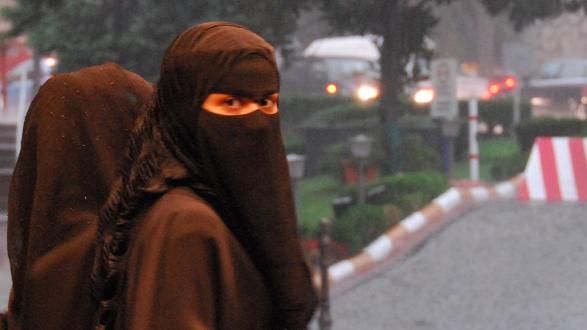In:
Global Beat is your weekly stop for news from around the world. Join us every Friday morning for important stories you should know about.
This week, Turkey’s military lifted its ban on women’s headscarves; Russia launched an official tracker of “fake news”; China has nearly finished structures designed to hold long-range missiles on artificial islands in the South China Sea; and more.
____________________
Americas
The U.S. Department of Homeland Security released a memo on Tuesday in which it unveiled new immigration policies that are said to have "deeply troubled" Mexico. Mexico’s Foreign Minister Luis Videgaray stated that Mexico will not accept "measures unilaterally imposed" on it by the United States. U.S. Secretary of State Rex Tillerson and Homeland Security Secretary John Kelly traveled to Mexico on Wednesday for meetings with President Enrique Peña Nieto, ministers, and military officials.
Also check out:
- Ecuador faces polarizing presidential election run-off – John Murray Brown and Andres Schipani, Financial Times
Central & South Asia
The Pakistani military on Wednesday announced the launch of a nationwide anti-militant offensive known as Operation Radd-ul-Fasaad (Elimination of Discord). This comes in response to what was the worst attack on Pakistani soil since 2014 in Sehwan last week when at least 88 individuals were killed in a suicide bombing, in addition to attacks in Lahore and Peshawar only days before. Pakistan closed two of its borders with Afghanistan shortly after the latest attack, demanding Kabul take action against 76 terrorists it claims are hiding in Afghan territory.
Also check out:
- Azerbaijan’s president makes his wife second-in-command – Emily Tamkin, Foreign Policy
China & East Asia
China is in the final stages of building nearly two dozen structures designed to hold long-range surface-to-air-missiles on artificial islands in the South China Sea. China claims roughly 90 percent of the sea, however Brunei, Malaysia, the Philippines, Vietnam, and Taiwan also lay claim to some parts. The ministers of the Association of Southeast Asian Nations (ASEAN) continue to worry about the militarization of the region. Earlier this week, China criticized “relevant countries” for threatening sovereignty and security when the USS Carl Vinson was deployed on a routine patrol in international waters in the area last weekend.
Also check out:
- Former Hong Kong leader Donald Tsang jailed for 20 months for misconduct in public office – Venus Wu, Reuters
Europe & Russia
The Russian government on Wednesday launched an official tracker of “fake news” in an effort to discredit unfavorable Western reports as inaccurate. Five reports from U.S. and British media, such as The New York Times, NBC, and the Daily Telegraph, have already been listed on the site. The website provides links to the original stories along with a message stating the information in the material “does not correspond with reality.” Russia’s media is heavily dominated by state-run networks and agencies, and a state-funded survey conducted last October found that 51 percent of Russians do not trust the media and never or rarely see criticism of the government in the news.
Also check out:
- Turkey likely to close S-400 missile deal with Russia – Ali Ünal, Daily Sabah
Middle East & North Africa
Turkey’s military, the last institution that forbade women from wearing headscarves, lifted its ban on Wednesday. Women may now wear headscarves under their cap or beret as long as it matches the color of their uniform and keeps their face visible. This has further increased sectarian divides in a country that has had no state religion since 1920. Wearing headscarves in public institutions was initally banned in 1980, but under President Recep Tayyip Erdoğan’s previous rule as prime minister and now as president, schools, universities, the civil service, and the police force have removed the ban over the past decade.
Also check out:
Southeast Asia & Oceania
Australia welcomed its first visit of a sitting Israeli prime minister when Benjamin Netanyahu arrived Wednesday. Netanyahu’s arrival came only hours after Australian Prime Minister Malcolm Turnbull wrote an opinion column for The Australian in which he criticized a recent United Nations resolution as unfavorable to Israel. In turn, Netanyahu thanked Turnbull for being willing to “puncture UN hypocrisy” and described the two nations as “extraordinary friends.” While Turnbull has stated Australia remains in support of a two-state solution, more than 60 prominent Australians signed an open letter opposing Netanyahu’s visit and what they believe are recent actions “not symbolic of a nation desirous of building peace with its neighbors.”
Also check out:
- Laos president visits Cambodia amid border dispute – Logan Connor, Southeast Asia Globe
Sub-Saharan Africa
A South African court on Wednesday issued a ruling that the county’s attempt to withdraw from the International Criminal Court (ICC) was “unconstitutional and invalid.” South Africa initially decided to pull out of the ICC following the country’s refusal to detain Sudanese President Omar al-Bashir during a visit in 2015 at an African Union summit, despite an ICC warrant for his arrest. South Africa is a founding member of the ICC, which prosecutes war crimes and crimes against humanity. The court stated South Africa’s executive branch did not have power to make this decision without prior approval from parliament.
Also check out:
- Nigeria urges African Union to step in and stop attacks on foreign nationals in South Africa – Jean-Jacques Cornish, Eyewitness News




